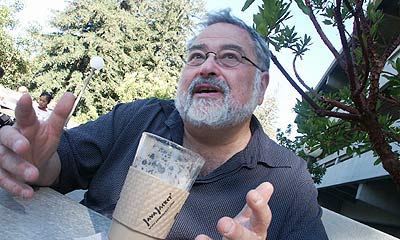Friday, June 16, 2006
Language and Politics
 Language is endlessly fascinating. I've just re-read a piece on Chinese translations of Hollywood film titles for internal consumption. Boogie Nights, the film about a well endowed porn star becomes His Powerful Device Makes him Famous' and Pretty Woman becomes I'm Rich but I like Prostitutes. However, my post this morning relates not to porn stars or prostitutes but to George Lakoff(pictured), the Berkeley professor who writes on language and politics.
Language is endlessly fascinating. I've just re-read a piece on Chinese translations of Hollywood film titles for internal consumption. Boogie Nights, the film about a well endowed porn star becomes His Powerful Device Makes him Famous' and Pretty Woman becomes I'm Rich but I like Prostitutes. However, my post this morning relates not to porn stars or prostitutes but to George Lakoff(pictured), the Berkeley professor who writes on language and politics.Lakoff argues that language is the key entry-point politicians use to infiltrate our minds and that the right have tended to be more resourceful in locating the appropriate codes. Each word is freighted with myriad connotations which spread meanings through the recipients mind. Some have 'good' resonances and persuade; other have negative ones and do not. Words, in other words, in politics become shorthand for networks of linked ideas. Lakoff argues the rightwing in the US have invested heavily into think- tanks and policy institutes which search for the right policies and the right language while the left have ignored the problem and lost out as a result.
The right's 'worldview', according to Lakoff, is that of the 'strict father': the world is a dangerous place and children have to 'made' to be good through discipline, punishment where necessary, self reliance and the acceptance of moral authority. People who have achieved self reliance through wealth are seen as having achieved virtue; meanwhile government programmes 'spoil' people by making them dependent. The right choose words which resonate with the architecture of this model. The War on Terror, for example, frames the idea of a legitimate national assault on the wholly unacceptable enemies of he motherland. Swarzenegger arrived with the huge advantage of a language embodied in his screen personna: he's going to take discipline to those lacking in virtue whether they like it or not.
The worldview of the left, on the other hand, is that of the 'nurturant parent' which assumes, fundamentally, that people are born good and that with empathy and love they can be formed into decent members of society. A key element is that people should care not just for themselves but for others too. Lakoff argues the left have been out-thought and out spent in the US and that the Democrats seem not to have yet pulled out of the trough into which Bush has cast them. It occurs to me, however, that the right's worldview is easier to sell as it is simple, contains drama and the emotional satisfaction of vilifying others- the poor - while the left's is more complex and harder to grasp.
In the UK, Blair has shown that a gifted politician of the left can find the language; the letter to Michael Foot, written by Blair in 1982, reveals how his mind was feeling for such an articulation even then. But now we see the desperate need for renewal as Blair's language-through his own overuse and abuse of it- has lost its power to move and is forced to give ground to a leader who seems to be finding the right words, embodying the right ideas for the current state of UK politics.
Comments:
<< Home
What about liberalism, or anarchism, which in theory propagates neither the 'strict father' nor the 'nurturant parent' thesis, but rather argues that people are not children, to be controlled, but autonomous actors, who know their own interests better than anyone else?
What indeed, Sam. I'm not saying Lakoff's analysis is right, merely explaining what it is. I've always thought that anarchist line by the way, smacks of the ideal rather than the actual.
Sorry, Skipper, I can't agree that Blair's letter to Foot shows he was "feeling" for an "articulation". I read it as a simple piece of arse-licking by a someone desperate for a safe parliamentary seat. I don't agree with your Hamar Shawcross analogy in your earlier post either: as you say Shawcross was a "poor boy from Manchester" (Ancoats, if I remember correctly); Fettes is quite a long way from that. I don't think Blair has had to compromise deeply-held beliefs in becoming a successful practical politician. If you had said that of Prescott, or even Brown, or (when he was alive) Robin Cook, I could see it (and I can see the problem also). But Blair? His accommodation to power was easily accomplished with no great need to wrestle with doubt or with previously held political beliefs. He went straight from public school, to the Bar, to Parliament. He was, so far as I can see, uninterested in politics, before he decided to try to become an MP. He did not have to betray his class or his upbringing. The Labour Party cannot complain that, when they choose him as Leader, they did not know what they were getting.
Fair enough point, Politaholic. Blair's biographer, Anthony Seldon reports only that Blair was only determined to 'make a difference', but I did suggest that his apparently religion or ethics based principles have proved perhaps less resilient than socialist ones would have done.
Steve
I think it was by Martin Wainwright in The Guardian, ages ago now. It contained other funny examples as well as the ones I gave.
Post a Comment
I think it was by Martin Wainwright in The Guardian, ages ago now. It contained other funny examples as well as the ones I gave.
<< Home





